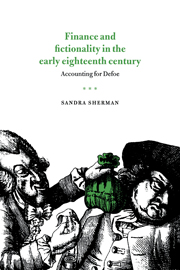1 - Credit and its discontents: the credit/fiction homology
Published online by Cambridge University Press: 12 January 2010
Summary
PUBLIC CREDIT
A brief history
For twenty-four years beginning in 1689, England was almost continually at war with the Continent, radically increasing the National Debt. The unlikeliness of a prompt discharge was implicit in the proposed “Fund of perpetual Interest” to carry the Debt. Long-term annuities for periods as long as ninety-nine years, with interest as high as 14 percent, proliferated. Lottery pay-outs extended to sixteen years. “The Government appear'd like a distress'd Debtor, who was every Day squeez'd to Death by the exorbitant greediness of the Lender.” By all accounts public credit was “sunk.” Long-term debt in 1708 exceeded £8 million. Another £2.5 million were added by 1710, supplementing short-dated bills exceeding £9 million for naval supplies, general war necessities, and miscellaneous expenses.
Defoe reflected the growing anxiety during a series on credit that appeared in the Review between 1710 and 1711. His main argument, a theme that was to dominate discourse during the coming decade, was that financial “securities” were valenced with insecurity, binding the nation to an endless entail of crushing obligation:
It is very evident, that in the present Circumstances of Britain, fifty Years Peace gives us no Breath, nor are we one jot the more able to begin a War again, after 50 years rest, than we are now to carry it on; all our Capital Branches of Income, are actually mortgag'd for an Hundred Years, that is, in one Sense, for ever; the Customes, the Excise, the Salt, the Stamp Paper, they are all Anticipated, all Engag'd …[…]
- Type
- Chapter
- Information
- Finance and Fictionality in the Early Eighteenth CenturyAccounting for Defoe, pp. 14 - 54Publisher: Cambridge University PressPrint publication year: 1996



